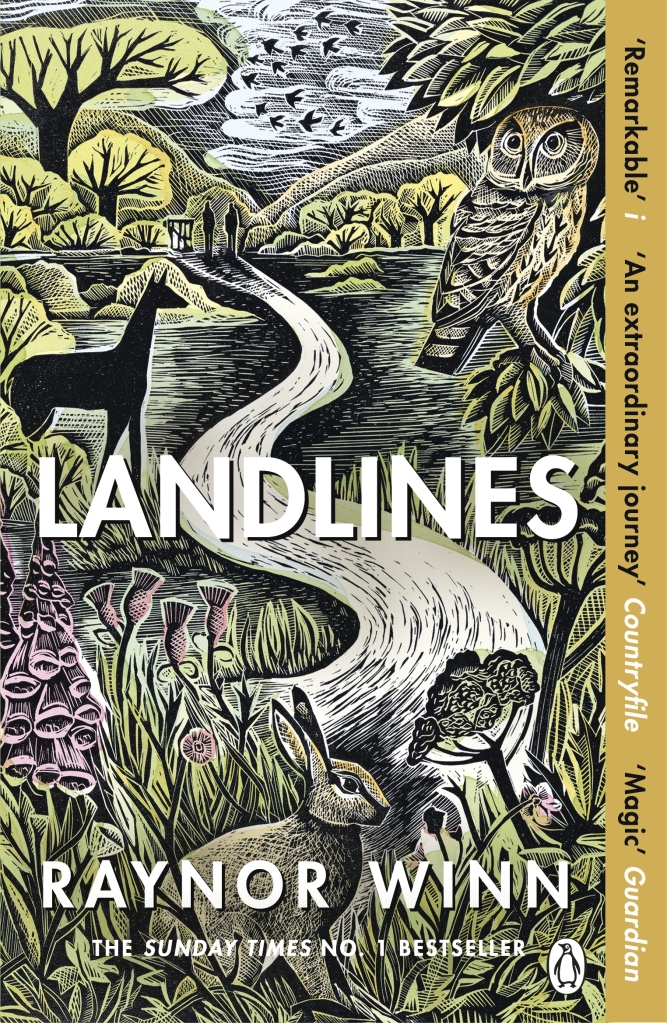
Reviewing Winn’s third walking chronicle
Lots of people complain that the Lord of the Rings is just ‘people walking for ages’ or words to that effect. The implication being that this would make for quite a boring read. However, the stakes, characters and effectiveness and variety of Tolkien’s descriptive passages make his books far from boring (at least in my opinion!). Raynor Winn however is less successful. This third of her books literally is just people walking for ages – all the way from North West Scotland down to Cornwall. Her husband Moth, diagnosed with corticobasal degeneration, experienced a seemingly miraculous recovery when the couple walked the South West Coast Path (chronicled in her first book The Salt Path). With Moth’s health deteriorating again in the wake of COVID lockdowns, they choose to take on more walking adventures, starting with the Cape Wrath Trail in Scotland.
I haven’t read Winn’s second book, but I enjoyed The Salt Path, partly because so many of the places they walked through were familiar to me from family holidays. With the intention of reading more non-fiction this year in my mind, I chose her newest book, assuming (rightly) that it wouldn’t be necessary to read the second one for the third to make sense. It wouldn’t be unfair to describe this new outing as ‘more of the same, but with lower stakes’. Although Moth’s health still weighs heavily throughout the journey, and is the ultimate motivation for it, the couple are now clearly perfectly well off financially, unlike in the first book where they were forced into homelessness, which prompted them to walk the coast path. It isn’t inherently exciting to read about two people slowly making their way round the coast, describing things that really have to be seen to be appreciated, so the perils of their situation added some necessary drama and uncertainty. Now that their situation is not precarious in the same way, it does remove some of the interest. Knowing that they can just check into a hotel whenever they want does reduce the peril and lower the stakes a bit. Which is great, I’m very happy for them, it just makes their story slightly less exciting.
Walking such a long way, even when surrounded by changing landscapes, is in its nature repetitive, and I’m afraid this is something that seems to have rubbed off on Winn’s writing. Her reliance on set phrases gives the book a real sense of drag – all the ‘endless cups of tea’ get a bit tedious. I don’t think it’d be unfair to say that she isn’t the most inspiring writer – she has a simple, honest style of writing which would be at home in Instagram captions (or maybe even just Instagram story captions…), but which I must admit I didn’t find up to the task of describing the myriad wonders of Britain’s multifaceted and beautiful landscapes. Somehow, she manages to make this varied and majestic isle seem quite, well, samey. I think it’s revealing that one of the book’s best lines, which she comes back to throughout and even pins their story on to some extent, is one someone else said to her (about ‘putting yourself in the way of hope’).
Another criticism often levied at The Lord of the Rings is that it has too many endings. Strangely this is another aspect which it shares with Winn’s book. Setting off expecting to do one walk, they end up tagging on another then another then another, and so on until they get all the way home. This just adds to the sense of repetition, as the end of each walk and start of the next brings near identical conversations, considerations and emotions. This doesn’t take anything away from their achievement, if anything it just adds to it. You can’t help but be impressed and feel excited for them. But once again I’m left with the sense that I would be more excited if I were following their story on Instagram or if I were friends with them on Facebook. In this longer format, it somehow manages to slow the pace even further.
One of the ways Winn attempts to add interest is by giving very brief summaries of the places they pass through. These read as quite surface level and lacking particular insight – it does feel a bit like she’s just looked up the Wikipedia articles for the places and summarised the first few sentences, which are themselves a summary. The other thing she does is frequently lament about the impact of climate change and habitat loss on Britain’s wildlife. This makes for melancholy reading, and we obviously agree that something needs to change. But the way she writes about it, at times gloomy, others perhaps more an attempt to be inspiring or stirring, just feel a bit watered down. They feel a bit like an unfinished/unedited George Monbiot article. I get the strong sense she read Peter Wohlleben’s The Secret Life of Trees before writing her own work, as numerous references to mycorrhizal fungi are some of the few scientific or scientific adjacent notes. Otherwise her writing on the subject feels familiar to anyone who has read the Facebook posts of a boomer hippie.
I realise this is sounding like an incredibly harsh review, and I couldn’t in all good conscience recommend this book. But if you’re looking for some walking inspiration, or are interested in alternative medicines, this could still be a good read for you. I enjoyed the earlier sections in Scotland, as this reminded me of my own time spent there as a very small child. But all in all, I think you’re probably best sticking to Winn’s first book. It shares some of the problems that crop up in this one, but has a greater sense of momentum and originality. There has been such a trend for books about the British countryside in the last decade or so that it’s hard to believe you couldn’t find something else a bit more inspiring to read than this one.
Gosh, I hardly ever write anything so scathing about a book, let alone about a contemporary one. The fact of the matter is that I just found this book a poorly written drag. It wasn’t outrageously badly written, but I just think Winn’s skill as a writer isn’t up to the challenge she’s set herself in trying to write about a) the varied and subtle beauty of the British landscape, and b) a very long and actually quite uneventful walk. Have you read any of Winn’s books? Have I been too harsh? As always, please bear in mind that these are simply my personal reflections – the book has sold so well that I’m sure there are very many people who disagree with me. I’d love to hear your thoughts on the book, whatever side you fall on, so please do share them in a comment!
